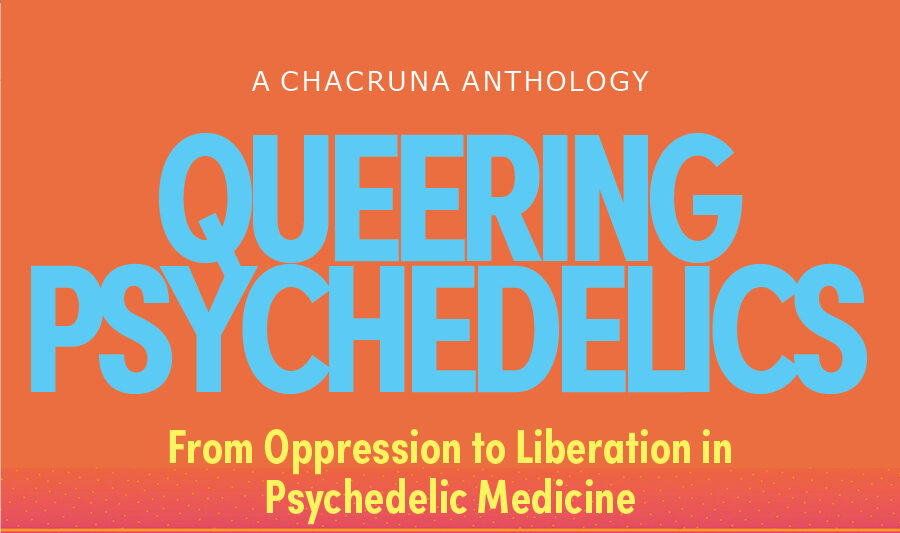[This article is an adapted excerpt from the anthology Queering Psychedelics: From Oppression to Liberation in Psychedelic Medicine, published by Synergetic Press in December 2022.]
Since psychedelics remain illegal in the United States and many other countries, anyone interested in psychedelic therapy, ceremony or recreational use is participating in “alternative culture.” Queer people thrive in alternative cultures, for we have been kicked out of our homes of origin, unaccepted by society, jailed, beaten up and killed just for being our true selves. We have become experts in creating alternative culture.
We have created our own chosen families, our own sources of support and our own versions of healing. We then imagine and create the mistaken belief that others who are on the fringes of society want to support us or align with us, and it becomes even more painful when they don’t or when they harm us.
The reality is, just because scientists, researchers and therapists are motivated to create new therapeutic healing modalities to treat PTSD, anxiety and depression using psychedelics does not mean they have the queer community’s (or any other marginalized community: POC, disabled, etc.) interests at heart.
The narrative that “psychedelics always work” leaves no nuance for when things go wrong.
Unfortunately, we have seen the real damage of being othered in society. It took until 1973 for the Diagnostic and Statistical Manual of Mental Disorders to stop classifying homosexuality as a mental illness. Queer people have been harmed by the use of psychedelics in the process of conversion therapy. It is not surprising that we have a distrust of the medical establishment.
The danger of psychedelic privilege in a therapeutic setting is that the needs of queer and all marginalized communities can be erased in the quest for legalization and normalization. Without federal legalization making psychedelic healing as routine as the use of other pharmaceutical drugs, the movement is forced to use a narrative that “psychedelics always work.” This narrative leaves no nuance for when things go wrong, like therapist abuse or sexual misconduct.
Many Paths Needed for Healing
Most FDA-approved research reinforces a heteronormative gender binary system. What about patients who have been harmed by specifically that system? We need more queer and trans therapists. We need many modalities that take into account people’s lived experience and minority stress. We need all therapists trained in gender inclusivity, LGBTQ history, anti-racism and cultural awareness.
The work of justice, equity, diversity and inclusion needs to be part of psychedelic therapy; it needs to be woven into the fabric of this healing. As we create a path forward for legalized psychedelic therapy, we need to be thinking from the beginning how will we make this accessible to low-income, queer, BIPOC and disabled people, and anyone on the margins. Otherwise, psychedelic therapy becomes just like every other therapy: easily available to those with resources and harder to attain for those without.
In addition, if society only permits psychedelics to be used in a healing modality, what does that mean for rituals and ceremonies? Whose culture are we then ignoring or pushing to the side, and for which population to then benefit? The risk is that it will become normal for white straight people to access psychedelic therapy but society will shame or harm BIPOC and queers of all races for doing their traditional psychedelic ceremonies.
Queer Liberation
For generations, queers have been denied appropriate medical care, so we have created our own spaces of healing, including powerful ceremonies and rituals using psychedelics to overcome shame and societal harm. People have often left those rituals empowered to be their full, beautiful selves.
On the other hand, there have been issues of problematic substance use as well as queer people attempting to use psychedelics for self-healing and having challenging journeys with no support or structure. In response to witnessing the impact of substance use—positive, negative, and all that’s in between—in my community, I launched a new workshop, titled Drugs: The Good, the Bad and the Ugly.
This workshop became a space for queer people to share our stories; to revel in the joy of knowing that so many of us found ourselves, our gender identities; a place of deep personal acceptance of our queerness, through psychedelics. It also served as a place to mourn and grapple with the loss of our friends to overdose, and the loss of queer leadership.
People shared stories of using psychedelics to heal years of pain and minority stress. Others shared stories of using too much ketamine to the point of becoming addicted, harming their liver and gallbladder, and missing important events and meetings because they were in a “K-hole.”
“A place we would feel at home.”
At the end of every workshop, I would ask the participants the same three questions: “What is the call to action? What do you want to see happen? What do we want to do as a queer community?”
The answer in every workshop was always the same: “We need a safe place at events, festivals and parties where queer people can go when having challenging psychedelic journeys and know we will be received and held by other queer people. A place where people will not be misgendered, where gender can be expansive and our sexuality embraced. A place we would feel at home and be our real selves.”
Thus began a journey to create the first-ever queer-centered psychedelic harm reduction program. As with all great queer ideas, it was a brilliant team effort to create and launch Queerdome. None of us could have made it happen solo, yet the team together created and birthed a new and important chapter in psychedelic harm reduction: A space designed and run by and for queer people.
Image courtesy of Synergetic Press





Show Comments